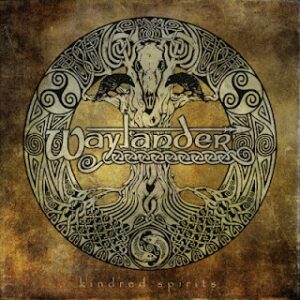Sharp of guitar, deathly of vocal and possessed of mournful folkish elements, Waylander are considered to be amongst the fore-runners of the loosely grouped Pagan/folk-metal genre. This album, their fourth full-length outing (and second album on heavyweight label Listenable), safely cements that reputation and although it deviates little from the established pattern, Waylander have both the melodic chops and musical skills to stay safely ahead of the pack.
Opening with ‘Echoes of the Sidhe’ it’s clear from the off that the folk elements are far more than just an afterthought in Waylander’s epic musical adventures. Driven by the seething guitars of Tor Dennison and Saul McMichael, it is the musical diversions of the ludicrously talented Dave Briggs (who handles Tin whistle, Irish Bouzouki, Mandolin and Bodhran) that draw the attention and develop the all-important melodies. Meanwhile ArdChieftain O’Hagan’s grizzled voice steers the music in a deathly direction, his steel-plated vocal chords absorbing endless punishment as he barks out the epic lyrics to tracks such as ‘quest for immortality’. It is powerful stuff, make no mistake, but far more than any other band that relies on synths to introduce the folk elements, the decision to have a full-time band member capable of delivering the requisite sounds in a suitably organic fashion lends Waylander an earthy charm that is all their own.
Second track ‘Lamh Dearg’ opens with an acoustic guitar maintaining a fast rhythm for what initially appears to be a more traditional folk track before the blizzard of guitars arrives, hauling with it the icy cold riffs and deathly vocals that made the opening track so devastating. With intelligent lyrical content (which touches on the plight of N. Ireland for the first time since the band’s demo), it’s a song that works on many levels and requires a few listens to get the most out of. ‘Twin fires of Beltine’, meanwhile opens hard with tin whistle present and correct before slipping sideways into a choppy time signature and awkward groove that is both heavy and arresting, grabbing your attention and keeping it till the very end, particularly through the stunning breakdown that sees spoken word passages and beautifully phrased solos building towards a final conclusion which recalls the brilliant Korpiklaani. ‘Of fear and fury’ builds out of an ominous acoustic passage, the guitars slowly chiming in, until the band kick in to deliver a song that perfectly matches its title, the fire and fury delivered in equal measure via biting riffs and crushing percussion.
The elegiac ‘grave of giants’ appears next, the lilting melody the perfect counterpoint to the berserker-like fury displayed elsewhere, the vocals delivered as a spoken-word monologue over a backdrop that speaks of desolate countryside and flowing streams far, far away from the over-crowded, smog-filled cities of our so-called ‘civilised’ world. It’s emotive, beautifully played music that comes straight from the heart, and it’s over all too soon, ‘a path well trodden’ slamming into the listener with sudden force and vital urgency, the syncopated rhythm laying down a solid backbone to the pummelling central riff and the vocals a deathly smear, barely discernible despite being relatively high in the mix, and the bass thundering out with real resonance. ‘Quest for immortality’ is equally powerful, opening with a roar of pure, unadulterated rage and a riff that churns and boils over the rattling percussion. It is brutal stuff indeed, certainly far closer to the death metal end of the spectrum, despite its massive sing-a-long chorus (perfect for a mosh pit filled with beer-fuelled Pagan warriors), than it is to folk and the most important factor is that Waylander never fail to keep things interesting, with multiple elements such as massed vocals, awkward time changes and multiple riffs per song all keeping the listener riveted.
Of the final two tracks, ‘Erdath’ is initially a haunting, moody piece that once again showcases the value of developing your sound beyond a simple, furious attack. A beautiful introduction, it is here that the album’s heart lies, unfettered in nature and free to roam the unspoiled landscapes, before the song’s crushing central riff smashes the mood to pieces with a snarl that is all the more brutal as a result of its contrast with the eerie opening. It’s a dynamic trick that pays off handsomely, keeping the song fresh, exciting and inventive to the very last, even over its seven and a half minutes, and still successfully delivering the adrenalin rush of the very best metal. The final track is also the title track and it opens on a contemplative note, all acoustic guitar and mournful tin whistle before the electrics once more appear like a cloud in the sky and the downpour begins. It proves a fine and fitting end to the album, perfectly balancing the power and aggression of metal with the wistful, nostalgic beauty of folk.
Some four albums in, Waylander prove that whilst they’ve still got ideas in spades, they have also developed musically and as a result the sound here is of a tight, professional band who have held onto their souls in an often cut-throat business. The music here is epic, powerful, sometimes devastating but, and this is far more important, it is played with the fire and passion of a new band. Musically moving and lyrically deep, Waylander are a band that prove just how innovative the folk-metal genre can be when done well, and ‘Kindred Spirits’ is done very well indeed. A beautiful, inspirational and often stunning album.




